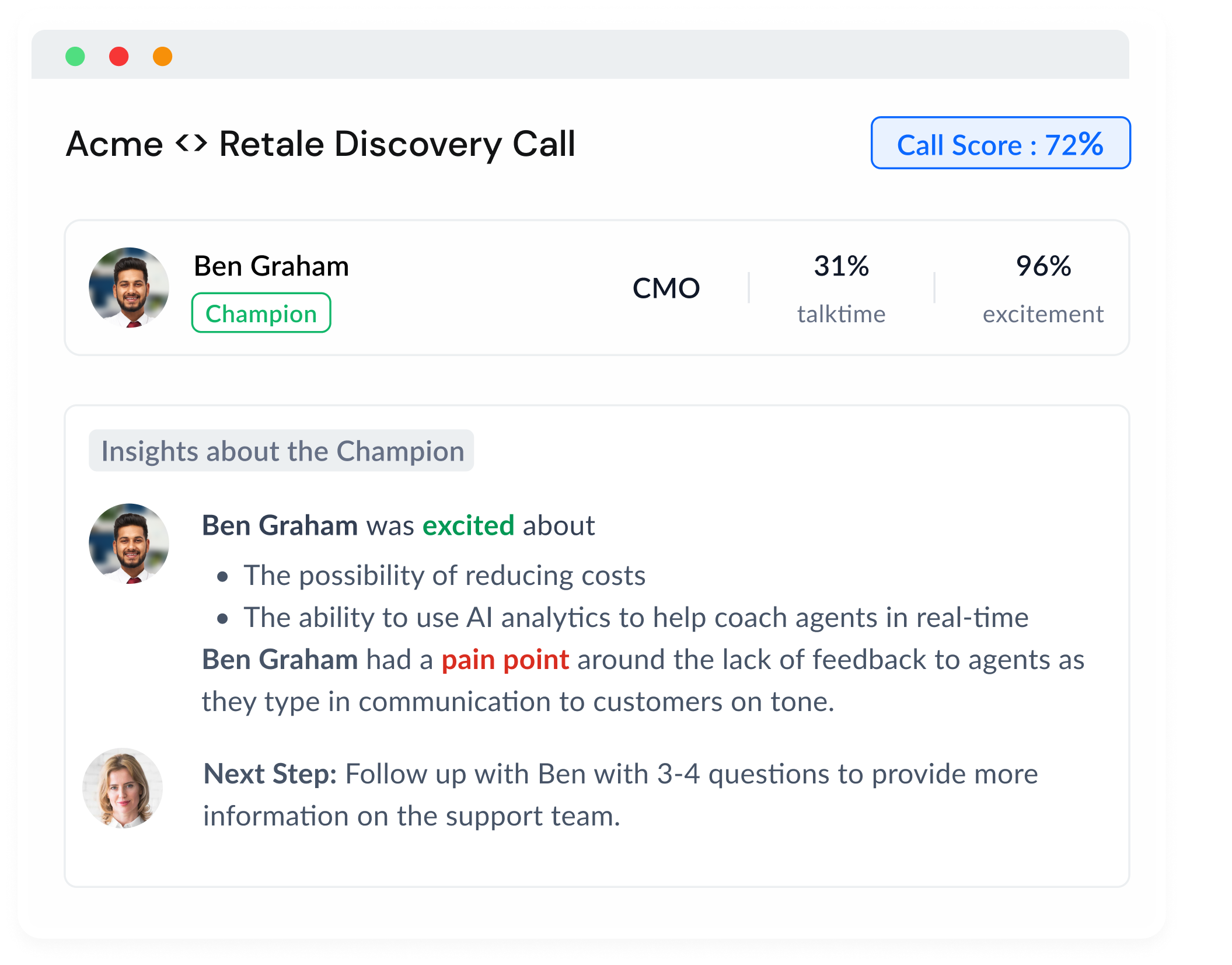Picture yourself in a movie scene: the lights dim, and a hush falls over the C-suite audience. The air is thick with anticipation. It's your turn to take center stage – will you be the hero who leads the sales department to untold glory? Or will you fumble, leaving the coveted trophy of success unclaimed?
[Insert dramatic music here]
It's safe to say that your quarterly meeting with the CEO isn't actually a Hollywood blockbuster. But let's be honest, it can feel like your career hinges on that one presentation. And nobody wants to bomb in front of their boss – or worse, be escorted out like a fallen gladiator.
Good news, fearless sales leader: we've got your back. This guide is here to ensure that your CEO walks away from your meeting thirsting for more (of your stellar insights, of course). We'll dive into the essential CRO metrics, VP Sales metrics, and sales metrics that you need in your arsenal if you want to cross that finish line with flying colors. So grab your cape (optional), and let's get started!
The Obvious Targets: Revenue and Burn Multiple on Sales & Marketing Spend
Just like spinach to Popeye or donuts to Homer Simpson, revenue is the lifeblood of well, any business. It's a no-brainer that your CEO (and your entire team) will be on the edge of their seats, waiting to hear the answer to one crucial question: “Are we making money, or are we going to end up on the business obituaries?”
Your best ally in appeasing stakeholders' concerns is cold, hard, factual data. Constant vigilance on revenue growth, the main KPI for any VP of Sales (we see you, SaaS champs), keeps you informed about your organization's progress while signaling potential hurdles that need to be tackled head-on.
Besides revenue, your CEO wants to know if the company is maximizing the return on its two most prized investments: sales and marketing. That's where the burn multiple on sales and marketing spend comes in. To keep it simple, you want to show that your company's growth is not a one-hit wonder but rather the head-banging result of a rock-solid strategy.
To convince your boss that you're a financial whiz, create visuals to illustrate your burn multiple and how it ties to overall revenue trends. Highlight the return on investment and emphasize any tweaks made to enhance efficiency. Because nothing's more powerful than proving that your sales and marketing machinery is pumping like a well-oiled engine.
(Time to crack those knuckles and put those PowerPoint skills to good use!)
Measuring the Productivity of Your Sales Team
The secret sauce to accelerated revenue growth? An incredibly productive sales team that thrives on excellence. That's right, we're talking about a squad of skilled ninjas, hitting targets left and right. But how do you gauge the productivity of your warriors? Enter stage left: sales metrics.
Metrics like Close Rate, Average Sales Cycle Length, and Quota Attainment provide a candid snapshot of your team's performance. These indicators can help you pinpoint areas where your reps are crushing it (time to pop some well-deserved champagne) or struggling (Houston, we have a problem).
If your close rate resembles that of a sluggish turtle, it might be time to reevaluate your team's sales techniques. An unusually lengthy sales cycle could be a red flag, suggesting there's room for improved efficiency in getting deals over the finish line. Also, beware low quota attainment – it might be a hint of unrealistic goals or aching weaknesses in your sales playbook.
By tracking these metrics and presenting them compellingly to your CEO, you demonstrate not only your firm grip on your team's strengths and weaknesses but also your relentless pursuit of high-flying excellence.
Forecasting Accuracy: Staying One Step Ahead
When it comes to running a successful business, seeing into the future isn't some mystical gift reserved only for wizards and oracles – it's a skill that needs to be honed through accurate forecasting.
Staying ahead in the sales game means you need to know what's coming around the bend. Reporting metrics that prove your forecasts are accurate (or flawed, gulp) is pivotal for your CEO when making strategic decisions. "Should we expand the team? Invest in a new tool? Hold the fort?"
Forecast-to-Actual Ratio and Win Probability are two key barometers to have in your bag of tricks. Accurate forecasting can be the difference between a smooth sales operation and a train wreck of epic proportions. Nobody wants to leave their CEO blindsided, staring down the barrel of missed targets and budgetary chaos.
Regularly use these metrics to refine your crystal ball (aka your forecasting model) and adjust your strategies accordingly. Your CEO will appreciate your prescience and, more importantly, your unwavering commitment to continued growth and success. And hey, you never know – you might just earn yourself the moniker of "Sales Prophet" around the water cooler!
New Deals Insights: The Characteristics of Success
Who wouldn't want to know the magical ingredients needed to brew the perfect potion of deal closing prowess? And wouldn't you love to share these revelations with your CEO, demonstrating how the sales team stalks triumph like lions on the hunt?
If profiling successful deals sounds like your idea of a blockbuster thriller, metrics like Average Contract Value (ACV), Customer Acquisition Cost (CAC), and Churn Rate are the protagonists of your novel.
Calculating ACV helps you uncover the mystical land of profitable deals. High ACVs often indicate a strong value proposition that is resonating with clients. Low CACs, on the other hand, are music to your CFO's ears – more profit without the heartache of exorbitant customer acquisition costs.
Churn Rate is the ultimate buzzkill – a high percentage of customers parting ways can signal the need for an urgent change in your retention strategy. Keep the churn low, and your CEO and the team will remain intoxicated by your sales team's charms.
Paying close attention to these metrics and adapting your tactics accordingly can help you replicate success, identify lucrative customer segments, and wow your CEO by showcasing how your sales team conquers the battlefield, deal after deal.
Identifying and Responding to Shifts in Ideal Customer Profile (ICP)
You know what's worse than presenting your CEO with a stale cheese sandwich? Reporting on sales metrics that focus on an outdated ICP. To drive relentless growth, it's essential to recognize changes in your ICP and adjust your sales strategy accordingly.
Metrics like Customer Lifetime Value (CLV) and Segment Performance can shed light on elite clientele who herald robust revenue potential. Additionally, these insights help you adjust your ICP to match the ever-evolving landscape of your market.
Keep an eye on high-performing customer segments and those lagging behind. By detecting patterns early and pitching these insights to your CEO, you can capitalize on lucrative opportunities and whip together the perfect antidote for market challenges.
Staying on top of these metrics will keep your sales team nimble and show your CEO the fruits of your labor – a well-adapted, forward-thinking sales force that never rests on its laurels (or eats stale sandwiches).
Learning from What's Not Working to Boost Performance
In the epic tale of sales success, there's an often-neglected but equally valuable set of characters: negative sales metrics, aka the lessons lurking behind lost deals and exits. Uncovering the reasons behind your sales team's flounders (cue sad trombone) can help you address weaknesses and turn them into strengths.
Metrics like Lost Deal Reasons and Sales Rep Attrition beckon you to venture into the land of "oops" moments. These measures reveal where your team dropped the ball or why deals dissolved like cotton candy in a rainstorm. By identifying patterns, you can whip your sales strategy into shape and equip your team with the tools and training they need to stage a comeback.
Sharing these insights with your CEO not only highlights your dedication to continuous improvement but also showcases your humanness – a willingness to learn from failure, dust yourself off, and rise like a phoenix from the ashes of defeat.
Bonus: CRM and AI Tools to Elevate Your Reporting Game
The world of sales metric tracking is like a treasure trove of insights just waiting to be mined. With the right tools, SaaS sales leaders can find the precious gems within their data – and we're here to give you an Indiana Jones-style compass.
Meet Sybill, an AI coach and assistant for sales reps that’ll help you track and analyze these crucial metrics. Much like your favorite superpowered sidekick, Sybill swoops in to make your life easier by automating CRM custom fields, transcribing sales calls, and even crafting follow-up emails. It's a brave new world where AI steps up, so you can step into the spotlight as your sales team's hero.
The moral of the story? The more tools and resources you wield, the better prepared you are to present your CEO with a comprehensive, success-driven sales narrative. And who knows? You just might unlock a hidden world of growth, conquering the sales universe one metric at a time.
Conclusion
There you have it, fearless CROs and VPs of Sales: the holy grail of metrics you need to triumph in your battles, keeping your CEO entertained, impressed, and hungry for more as you steer your SaaS ship through treacherous waters.
No longer will you be haunted by the ghosts of meetings past. Equipped with these powerful metrics and insights, you'll emerge as the shining beacon of sales wisdom. Share growth trends, dissect productivity, strategize with laser-sharp forecasts, and learn from your missteps – all while showcasing your adaptability and relentless pursuit of success.
Remember, knowledge is power – and in the realm of sales, these metrics are the key to unlocking unstoppable growth. So go forth, unlock the secrets of your sales data, and carve your path to world domination (or at least, another great quarter).















.png)





